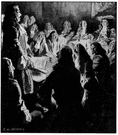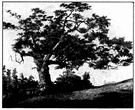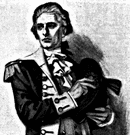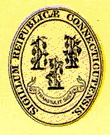The Making of the 50 States: Connecticut
Part 2: The Rest of the Story In a sign of things to come, the American settlers began to have differences with the British king over who should be ruling what part of their lives. By 1662, John Winthrop was governor of the Connecticut Territory, and he had a royal charter from Great Britain that gave him authority to rule over the people in the king's name. Many people were unhappy with far-away Great Britain and what they thought was interference in their lives, but many people liked the protection that Great Britain provided.
As Connecticut continued to grow, its inhabitants continued to be disappointed with Great Britain and its management of the colonies. Connecticut militiamen fought alongside British soldiers in the French and Indian War. But the financial burdens of that war provided more disillusionment with the British cause among Americans. The Stamp Act was particularly harmful to Connecticut, which had not only two of the 13 Colonies' original newspapers in the Connecticut When war began, hundreds of militiamen from Connecticut went to Massachusetts to fight for independence. One of these was Israel Putnam, who was the commander at the Battle of Bunker Hill, the man who uttered the famous line "Don't fire until you see the whites of their eyes."
Most of the fighting during the Revolutionary War took place in other colonies. One skirmish took place at New London, where British forces led by turncoat Benedict Arnold landed in 1781, captured Fort Griswold, and burned much of the town. Connecticut played a large part in the eventual American victory in other ways, however, including supplying the Patriot Army with many things, including beef, salt, flour, and (especially) gunpowder. Commanding General George Washington was known to refer to Connecticut as the "Provision State." Once the American victory was secure, things returned to normal in some ways and were all new in others. When the Articles of Confederation proved unworkable, Connecticut joined the other 12 colonies in sending delegates to what would become the Constitutional Convention. The three men who attended the momentous events in Philadelphia were Oliver Ellsworth (a future Chief Justice), William Samuel Johnson, and Roger Sherman.
First page > The Rest of the Story > Page 1, 2
|
|
Social Studies for Kids
copyright 2002–2026
David White



 With the coming of a royal charter came the appointment of royal governors. A series of these held authority for several years. Sir Edmund Andros was governor in 1687. In that year, the British king, James II, had had enough of the settlers' "disloyalty" and ordered Andros to take away the royal charter. This would be a significant blow to the settlers because it would take away the right to own the lands that they did. The people called an assembly to discuss the problem, and the royal charter was put on a table. The candles were blown
With the coming of a royal charter came the appointment of royal governors. A series of these held authority for several years. Sir Edmund Andros was governor in 1687. In that year, the British king, James II, had had enough of the settlers' "disloyalty" and ordered Andros to take away the royal charter. This would be a significant blow to the settlers because it would take away the right to own the lands that they did. The people called an assembly to discuss the problem, and the royal charter was put on a table. The candles were blown  out suddenly, and the charter disappeared. Connecticut tradition has it that in the darkness, Captain Wadsworth of Hartford took the charter and hid it in a hollow spot in a large oak tree nearby. This became known as the
out suddenly, and the charter disappeared. Connecticut tradition has it that in the darkness, Captain Wadsworth of Hartford took the charter and hid it in a hollow spot in a large oak tree nearby. This became known as the  Gazette and the Connecticut Courant, but also conducted a great deal of business that required the "stamps" that Great Britain was now taxing. As with the other colonies, Connecticut was often the scene of internal struggles between Patriots and
Gazette and the Connecticut Courant, but also conducted a great deal of business that required the "stamps" that Great Britain was now taxing. As with the other colonies, Connecticut was often the scene of internal struggles between Patriots and  Another famous man from Connecticut was
Another famous man from Connecticut was  The resulting
The resulting 
